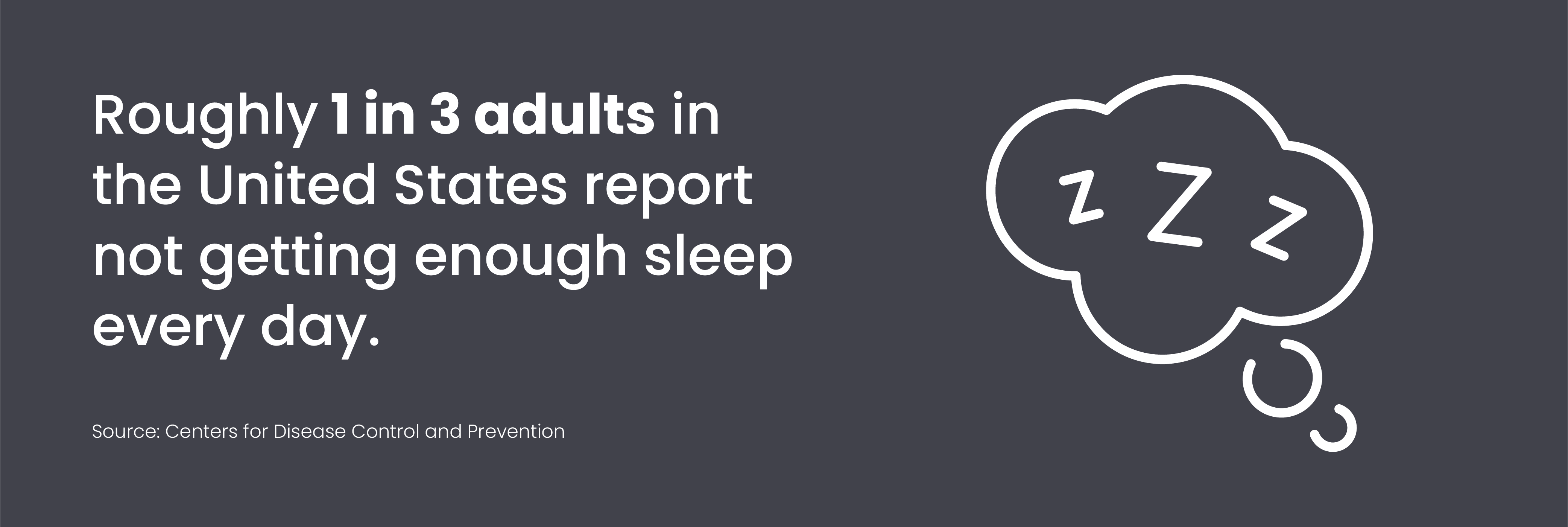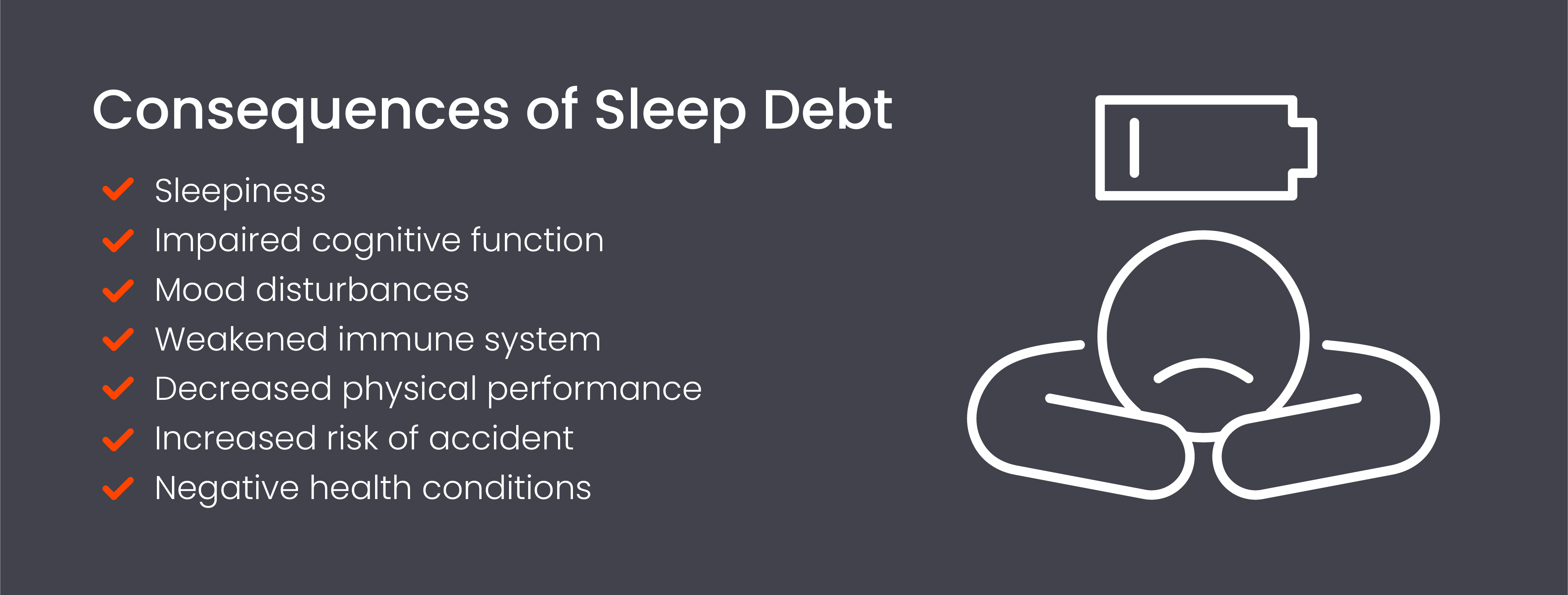Skipping a few hours of sleep due to deadlines, late-night festivities, or simply binge-watching TV is something we’ve all done, telling ourselves that sleeping in on the weekend can help us catch up on lost sleep. Ever wondered how long you can go without sleep? While the exact answer varies from person to person, the consequences of consistently missing out on restful nights are universally adverse. But can we really make up for sleep debt? Does sleeping in on Saturday completely erase the effects of a week’s worth of shortened nights?
Unfortunately, the human body doesn’t work like a checking account where you can withdraw now and add it back later. Keep reading for an in-depth sleep debt definition and how accruing sleep debt can affect you.
- What Is Sleep Debt?
- What Are the Consequences of Sleep Debt?
- How Can You Avoid Sleep Debt?
- Can You Catch Up on Lost Sleep?
- Wrapping Up: How to Fix Sleep Debt
What Is Sleep Debt?
Sleep debt, also known as sleep deficit, is the difference between the amount of sleep you get versus the amount of sleep your body needs. Like any debt, sleep debt accrues when you aren’t getting enough sleep every night. How much sleep do you need? Typically, 7-9 hours is recommended for most adults. If you only sleep five hours one night, your sleep debt is 2 to 4 hours.
In today’s fast-paced society, sleep often takes a backseat to other priorities, leading to sleep deprivation. Shockingly, roughly 1 in 3 adults in the US report not getting enough sleep every day.

Accruing sleep debt can lead to a slew of consequences, affecting everything from cognitive function and mood to physical health. While some individuals might believe they can function on fewer hours of sleep, the reality is that chronic sleep deprivation can eventually take a toll. Over time, the body collects its debt.
What Are the Consequences of Sleep Debt?
Sleep is an often underestimated pillar of health and profoundly impacts our day-to-day functioning and overall well-being. While it might seem harmless to shave off an hour or two or sleep occasionally, the cumulative effect, or sleep debt, can have consequences.

1. Sleepiness
One of the most immediate and apparent consequences of sleep deficit is daytime grogginess and sleepiness. This isn’t merely about feeling drowsy; it’s lethargy that can affect your daily tasks and reduce alertness. When you feel this level of sleepiness, you’ll feel like your batteries are low, operating at suboptimal levels.
This grogginess can affect even the smallest aspects of your day, from sending an email to reading, making routine tasks exhausting.
2. Impaired cognitive function
When deprived of its needed rest, the brain undergoes a series of changes that impact various cognitive functions. One of the most immediate effects is reduced concentration. Tasks that would typically be performed with ease may suddenly become more challenging, and attention spans can notably shrink.
This lack of focus is complemented by memory impairment. Sleep is fundamental for memory consolidation, a process crucial for solidifying and storing new memories. When sleep debt accrues, this vital function can be disrupted, leading to instances of forgetfulness and challenges in information recall.
A brain that’s not well-rested operates at a diminished capacity, affecting both work output and its quality. This decline isn’t just limited to professional endeavors but extends to personal projects as well.
3. Mood disturbances
One significant impact of poor sleep is that it can wreak havoc on your emotions. The smallest annoyances can become major irritants when we’re operating on insufficient sleep. Additionally, a lack of sleep can heighten our stress response, making situations seem more dire and overwhelming than they truly are.
4. Weakened immune system
The immune system is our body’s defense mechanism against disease. It relies heavily on sleep to function optimally. Chronic sleep deprivation can diminish the body’s ability to fend off infections, rendering us more susceptible to common illnesses like colds or even more severe health complications.
5. Decreased physical performance
The relationship between sleep and physical performance extends beyond muscular strength. Sleep debt directly impacts your body’s efficiency and capability. For instance, our motor skills and coordination are finely tuned with adequate rest. When we’re sleep-deprived, even the most mundane physical tasks can become challenging due to a lack of precision and coordination.
Additionally, sleep plays a crucial role in the body’s recovery process. After a demanding workout or any strenuous activity, our muscles undergo wear and tear, and it’s during sleep that they’re repaired and rejuvenated. However, when sleep debt accumulates, this muscle recovery process is hampered, potentially leading to prolonged fatigue and reduced physical performance long after you’ve worked out.
6. Increased risk of accident
A significant consequence of sleep deprivation is the increased risk of accidents due to impaired decision-making and judgment. When you’re not fully rested, your brain can’t process information as efficiently or react to situations with the same speed and clarity. This decline in cognitive responsiveness can elevate the risk of motor vehicle accidents. A sleep-deprived driver might not react quickly enough to a sudden obstacle or may make a flawed judgment call, leading to potentially severe consequences.
Another phenomenon linked with sleep debt is microsleep, which is fleeting involuntary bouts of sleep in which a person momentarily loses consciousness. These episodes can be incredibly dangerous, especially when driving or operating heavy machinery.
The risks aren’t just confined to the road or work. The lack of alertness and impaired coordination can make routine activities like cooking or using tools dangerous.
7. Negative health conditions
Sleep debt can also affect long-term health. One of the more direct consequences of sleep debt is its effects on weight. When our sleep patterns are disrupted, it leads to an imbalance in hormones that regulate appetite. An increase or decrease in these hormones can stimulate hunger and diminish the feeling of satiety. This combination can prompt overeating, increasing the risk of weight gain and obesity.
Beyond weight concerns, sleep deprivation can be detrimental to the heart. Continuous lack of sleep can contribute to conditions like cardiovascular disease due to increased stress hormones, irregular heartbeat, and increased blood pressure, all of which are associated with sleep debt. The body’s inability to regulate stress hormones due to lack of sleep can keep blood pressure elevated for extended periods, putting more stress on the heart.
How Can You Avoid Sleep Debt?
One of the pillars of avoiding sleep debt is maintaining good sleep hygiene, which involves practices and habits that help you enjoy consistent, uninterrupted sleep. Nurturing a sound sleep routine can significantly boost your daily functioning and overall well-being. Here are various strategies you can use to ensure a peaceful night’s slumber:
- Establish a consistent sleep schedule: Going to bed and waking up at the same time every day helps regulate our internal body clock, making it easier to fall asleep at night and wake up refreshed in the morning. Over time, this consistency can improve the quality of your sleep.
- Create a sleep-conducive environment: The ambiance of your bedroom plays a pivotal role in sleep quality. A quiet, dark, and cool room can promote restful sleep. Consider using blackout curtains, earplugs, or a white noise machine to shield against disruptions. Investing in a comfortable memory foam mattress can significantly elevate the quality of your sleep, contouring to your body and providing optimal support. For those seeking a balance between support and comfort, considering a hybrid mattress from Layla can be a game-changer. This unique blend of innerspring and memory foam technology ensures both comfort and durability.
- Reassess daytime habits: What we do during the day has a direct impact on our sleep at night. Consuming large meals, caffeine, or alcohol before bed can disrupt sleep. It’s essential to understand the relationship between caffeine and sleep and make conscious choices about your caffeine consumption throughout the day.
- Avoid life exposure before bed: Blue light emitted by phones, computers, and televisions can interfere with the production of melatonin, the hormone responsible for regulating sleep. By reducing screen time before bed, you can allow your body to produce melatonin more effectively to facilitate better sleep.
- Exercise regularly: Engaging in regular physical activity can greatly improve sleep quality and increase sleep duration. However, it’s essential to time it right. Exercising too close to bedtime can be counterproductive, leaving you too energized to fall asleep.
- Manage stress: Chronic stress and anxiety can be significant barriers to quality sleep. Adopting relaxation techniques like deep breathing, meditation, and mindfulness can help in winding down at night to help you reach deep sleep. You can establish a pre-sleep routine that involves these calming activities to help the body understand it’s time to rest. Another technique that has gained popularity is listening to specially curated playlists for sleep, which are designed to soothe the mind and prepare it for a night of deep rest.
Can You Catch Up on Lost Sleep?
While sleep might seem simple, its dynamics are complicated. The concept of catching up on sleep ultimately means believing you can repay your sleep debt. Unfortunately, sleep debt accumulates over time, leading many to wonder if it’s possible to catch up.
Napping and sleeping in on weekends are common tactics many use to counteract the effects of losing sleep, and they can be effective to an extent. A well-timed nap can alleviate feelings of fatigue and rejuvenate cognitive functions, acting as a temporary buffer against sleep deprivation. Similarly, allowing yourself to sleep in during the weekend can help reduce sleep debt accumulated during the workweek.
Unfortunately, these methods aren’t perfect. Relying solely on naps and sleeping in can disrupt your body’s internal clock, or circadian rhythm, leading to further sleep issues. For instance, sleeping in on the weekends or taking naps can make falling asleep during the weekdays even more challenging.
Recovering from massive sleep debt will require you to adjust your sleep schedule, which might mean going to bed earlier each night to allow for extended, uninterrupted sleep until your sleep rhythm normalizes again.
Ultimately, prevention is always the best cure. Instead of putting yourself in a position to catch up on your sleep debt, try avoiding it altogether. Taking steps to maintain a consistent sleep schedule and ensuring enough sleep at night is crucial. If sleep debt accrues, remember that it’ll take time to repay it in full.
Wrapping Up: How to Fix Sleep Debt
Sleep is essential for your physical and emotional health. While tactics like napping and weekend catch-up sleep can offer temporary relief, the best strategy lies in prevention. Maintaining a consistent schedule, aiming for the recommended 7-9 nightly hours of sleep, and making active adjustments if sleep debt starts to accumulate can get you back on track.
Recovering from extensive sleep debt demands time, patience, and an effort to realign your sleep patterns. Having the right sleep environment is crucial. With Layla’s premium mattresses, you can ensure that each night brings you closer to repaying your sleep debt and achieving restful sleep. Browse our collection of mattresses and other sleep products today.



